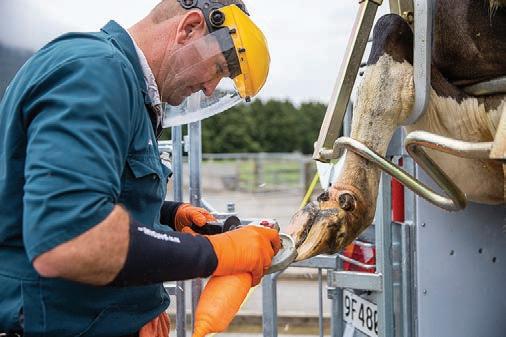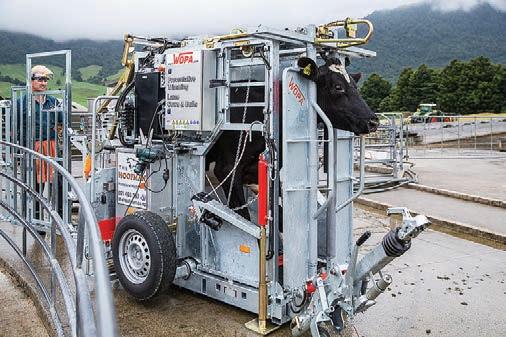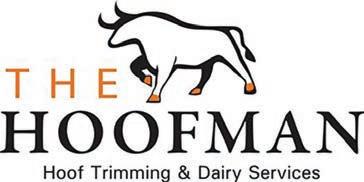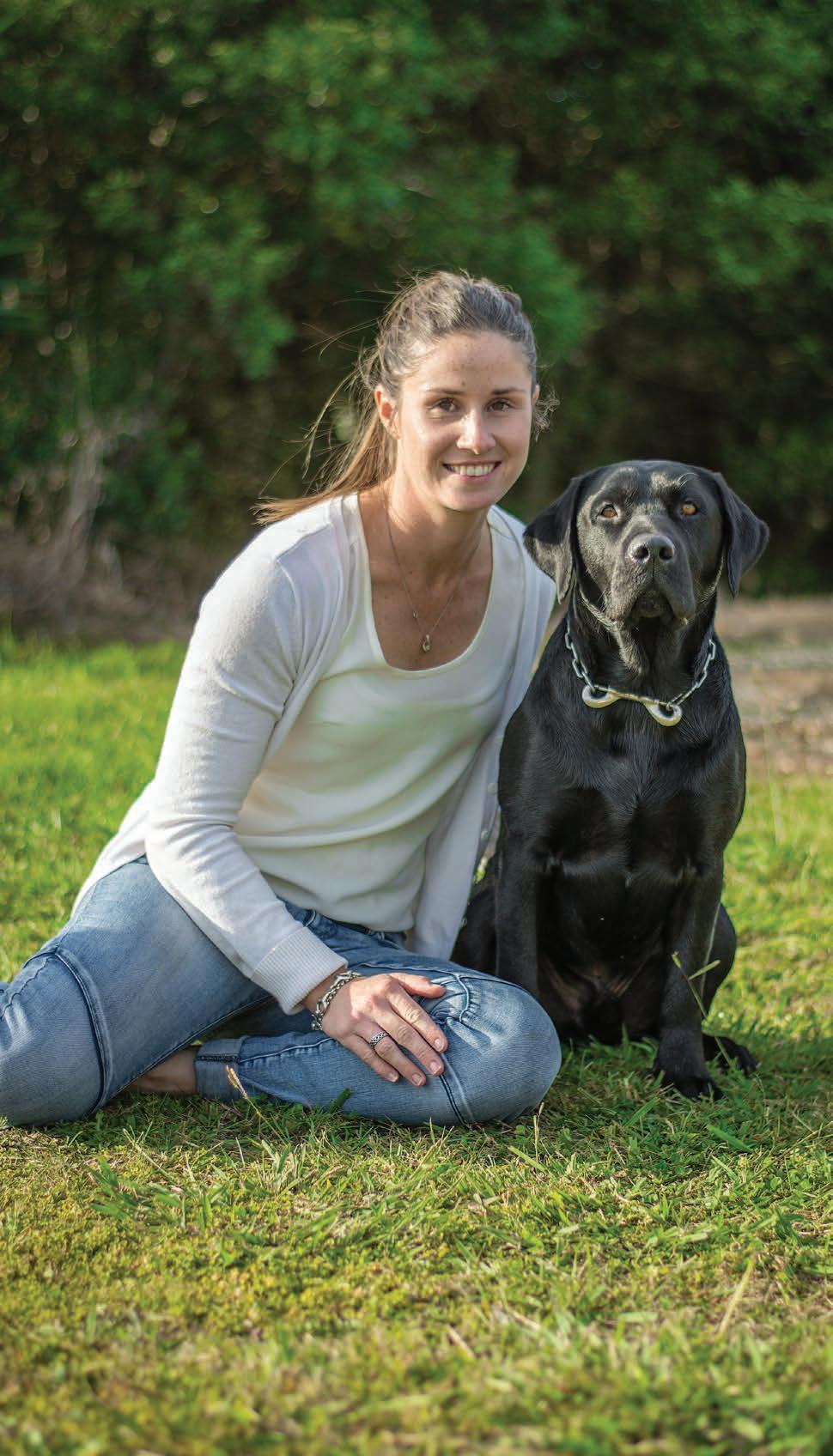
14 minute read
Women in agribusinessCatherine Newland
from Dairy Farmer November 2020
by AgriHQ
Love what you do, do it with love
Waikato farmer Catherine Newland wears several hats, including being a marriage celebrant.
By Cheyenne Nicholson
As Mark Twain said, “Find a job you enjoy doing, and you will never have to work a day in your life.” This is particularly true for a Matamata dairy farmer whose life may be hectic, but says she wouldn’t have it any other way.
Ask anyone who knows Catherine Newland and they’ll tell you the same thing, she loves being busy. With several different caps to switch between, and another being added to the mix in November with the arrival of her first child, Catherine says the key to juggling it all is making sure you’re doing things you enjoy.
“A lot of people would call what I do work. I don’t think of it like that. On the weekends when I’m out with my husband Rhys doing farm jobs it’s not work, it’s just us out there getting things done and enjoying ourselves. It won’t feel like a juggle if you’re enjoying what you’re doing,” she says.
Along with farm ownership, she works a 40-hour week as an Agri-Manager for LIC and on weekends switches her gumboots for her party shoes when she’s on the job as a marriage celebrant.
“I think as so often happens with kids who grow up on a dairy farm, I didn’t immediately consider dairy farming as a career option. My parents encouraged us to look at all our options and try other things as we always had the option of coming back to the farm. Because of that, I studied teaching then went to Europe for a year,” she says.
Her job with LIC was largely inspired by her mum, who also worked for the company. She instilled a passion and interest in herd improvement and genetics in Catherine.
“At the time, we were also sharemilking and had our own herd, and seeing the difference that herd
Catherine and Rhys own their 179ha Waikato farm in equity with Rhys’ parents. Ranges the farm was once a smaller part of a larger farm, meaning a lot has had to purchase or lease a run-off block to give them the ability to have a closed

improvement could make on our farm and our business, it made me want to share that passion with others,” she says.
“I love crunching numbers and seeing how quickly and significantly we can find change within any given farm system and then presenting that to a farmer.”
Having decided LIC was where she wanted to be, she got busy applying for jobs and quickly landed a role. Six years later, while it can sometimes be a juggle to fit everything in, it works well alongside the farm and means she gets to connect with her local farming community every day. Catherine does a lot of volunteer work in the primary industries too and currently sits on the Dairy Industry Awards committee, among others.
“It’s my way of giving back to the industry that’s given me so much,” she says.
When it comes to her eventual return part to play in this. A farm kid himself, she says he reignited a passion for farming in her. Having worked their way up the sharemilking ladder, the couple now own their 179ha dairy farm in equity with Rhys’ parents.
Located at the foot of the Kaimai be done from scratch and time taken to build up data.
“We’re in our fourth season here now, we’ve been pretty consistent with production but still figuring out the farm a bit. It’s around 145ha effective with the rest being steep country, which we have beef cattle on or is planted in natives and pines,” she says.
The 450-cow Jersey herd has some outstanding genetics.
One of their biggest goals is to to the land, her husband Rhys had a big
herd and look after all stock classes themselves.
“Profitability is another key focus of everything we do. It’s not about pushing production – unless it’s profitable,” she says.
“We’d love to do more per cow production but only if it will be more profitable in that system or given payout.”
“We’d like to work towards having a more resilient business that can ride the highs and lows of the industry as well. I think that’s an industry-wide goal.”
It’s not all work and no play though.
Rethink your routine
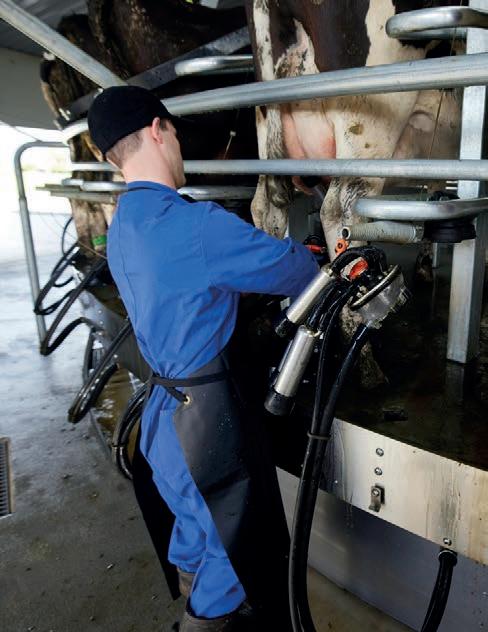
Milk your cows quicker, with less staff, thanks to the new iCR+ Intelligent Cluster Remover.
Taking away the need to push a button to activate cluster vacuum and the requirement to manually remove cups makes for an efficient, consistent milking experience. Plus, post-teat spraying can be taken care of, too.
In fact, one operator can milk more cows in less time thanks to the new iCR+ Intelligent Cluster Removers!
or your local dealer for a quote.
gea.com/new-zealand
Drive dairy efficiencies? We can help.
Catherine inherited her passion for herd improvement and genetics from her mum. The 450-cow jersey herd on the Waikato farm has some outstanding genetics.
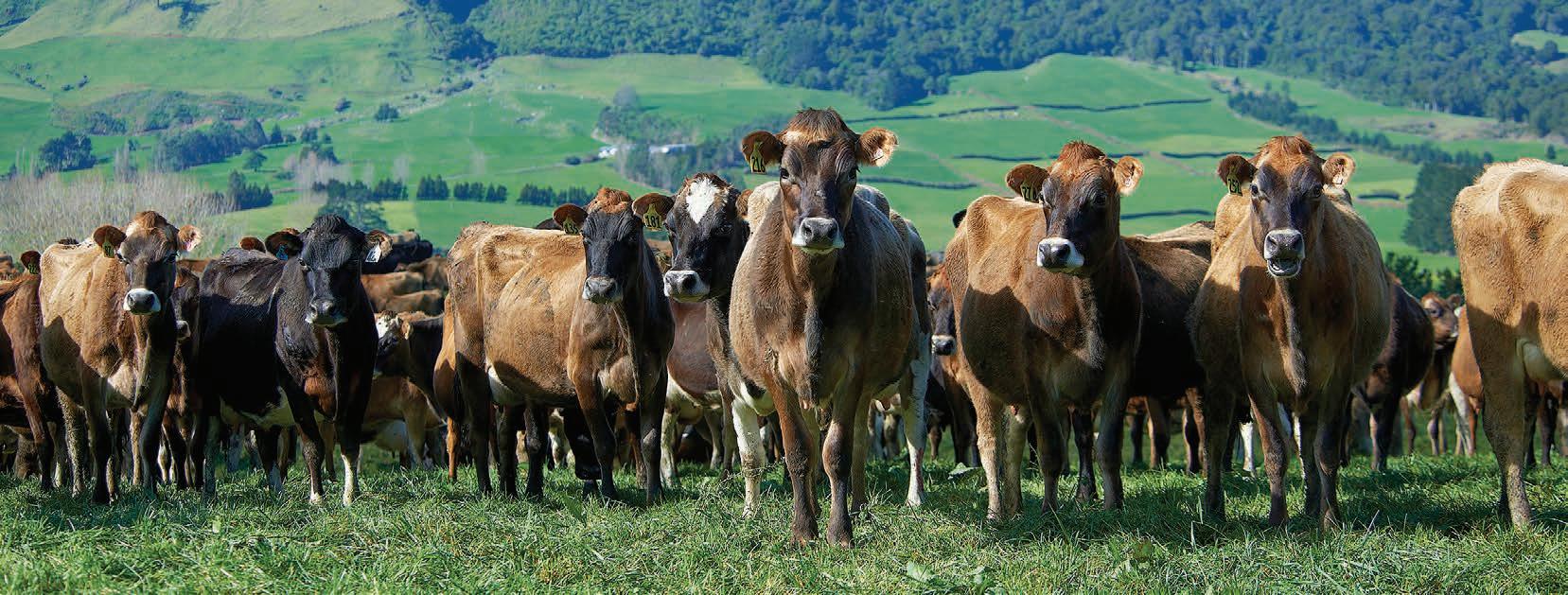
Tauranga city is a short drive away, which means they can get off the farm and enjoy some time in the city to recharge their batteries.
Having the opportunity to connect and engage with farmers from all around the area through LIC, Catherine has picked up tips and tricks from other farmers she’s been able to integrate into her own business.
“It might sound silly, but the dairy farmers I come across every day in my job inspire me. I constantly see things I think could work for our farm or simply get to have some really engaging conversations with people. It helps drive me,” she says.
“We also are so lucky to have some incredible people in the dairy industry who are so selfless and will down tools in a flash to help someone – that’s the sort of person I want to be for others in the future.”
You’d think that with a full working week plus a farm to run, Catherine’s schedule would be pretty full. Add to the mix her job as a marriage celebrant, and you can imagine how full her calendar looks. But as seems to be a tradition in her family, she likes to have a full calendar.
“Dad’s like that, he has a bad habit of doing too much, and we kids are the same. We’re all just 100 miles an hour, making the most of every moment,” she says.
“I’ve realised it’s important to focus on one thing at a time. I’d be lost without my calendar though, that’s for sure.
“I schedule everything from work appointments to time with friends, then during that time that’s blocked out, that activity gets my full attention.”
Her entrance into the world of being a marriage celebrant started after her own wedding. Having enjoyed the experience so much, she chatted to her own celebrant about pursuing the relevant qualifications to be a celebrant herself. With a firm belief in what marriage stands for, a love of talking and a love of love, the job suits her to a tee.
“The rest of my life revolves around dairy farming but as a marriage celebrant, it’s just so different. It’s often a much-needed mental break from farming too,” she says.
“I love being on the farm and working in the industry and wouldn’t want to do anything else, but it’s nice to switch off sometimes, swap my gumboots for a party dress and do something else.”
The business started as a hobby with a wedding here or there. Through word of mouth, the business started ramping up. She’s nearly fully booked for the summer ahead and already has bookings for the summer after.
“It’s grown very organically, if you do a good job at whatever you’re doing, the work will come. Doing a good job is the best form of advertising,” she says. n

PINZ puts spotlight on sector
The Primary Industries New Zealand Summit will once again shine a spotlight on the important role the primary sector plays in the economy and honour the most successful and innovative primary industry producers and supporters.
The Summit brings farmers and producers from across the broad range of NZ’s primary industries together with policy makers, regulators and other key sector stakeholders from the primary industries value chain, from iwi through to research and science communities, technologists and agribusiness marketers
This unique event provides a forum to hear a selection of world-class, global and local experts delivering insights that will support and enable the sector to plan and prepare for its transition and adaptation to a sustainable future.
Themes for Summit include: the implementation of the vision of the Primary Sector Council by Food and Fibre Aotearoa; analysing the global trade and export environment and markets for NZ produce; exploring global food trend – developing high-value products aimed at international consumers that care; achieving sustainable land use and
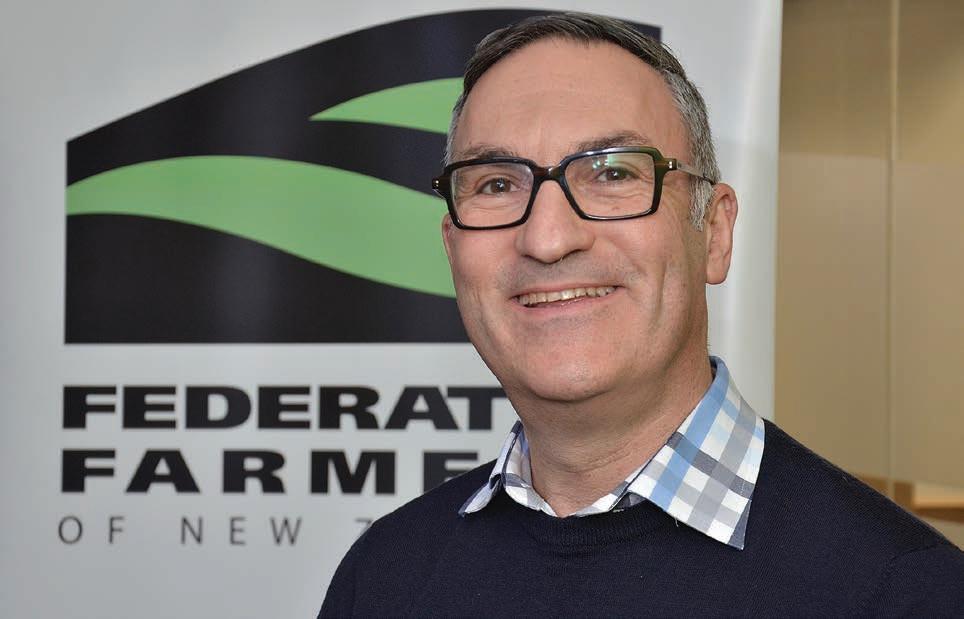
identifying practical actions to address agricultural emissions and exploring the latest technology led food disruption trends; and assessing the potential risks and opportunities presented by alternative proteins.
The 2020 Primary Industries New Zealand Awards will be presented at the awards dinner.
Judges faced tough decisions choosing finalists for the awards due to the large number of entries. The six independent judges deliberated over 40 nominations across the six award categories for the second annual PINZ awards.
“More than ever New Zealand needs the primary sector to be innovative and enterprising,” Federated Farmers chief executive Terry Copeland says.
“For our farmers, growers, foresters and fishers to continue to be at the top of their game as producers of quality goods exported to the world, we need suppliers and support agencies of the calibre of these finalists who can help us with cutting-edge technology and back-up.”
The Primary Industries New Zealand Summit and Awards will be held at Te Papa Tongarewa, Wellington on November 23 and 24. n
Rethink how you milk
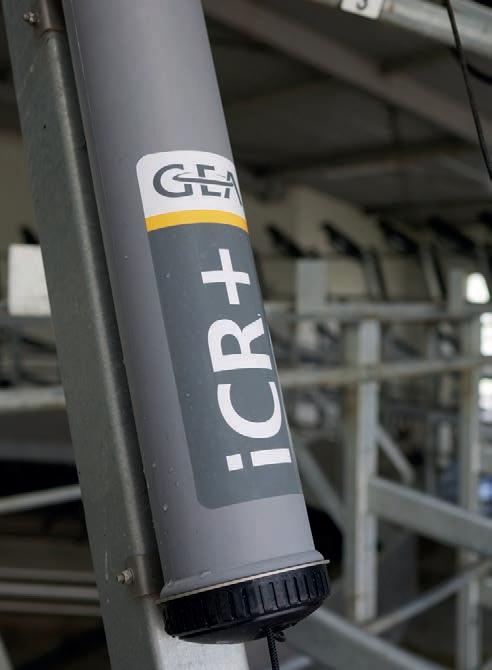
With the new revolutionary iCR+ Intelligent Cluster Remover from GEA.
Perfect for rotaries, herringbones, retrofits and new installs, the new iCR+ with EasyStart lift or pull vacuum activation helps you save time and labour, all while providing a consistent milking routine for both cow and operator.
Quick and easy to install, maybe it’s time to rethink how you milk? Call 0800 GEA FARM, or
your local dealer for a quote.
gea.com/new-zealand
Federated Farmers chief executive Terry Copeland says now more than ever, New Zealand needs the primary sector to be innovative and enterprising.
Drive dairy efficiencies? We can help.
Calf Club NZ judge Braydon Schroder has been involved with calf club for nearly 20 years, and is now giving back to help young children with their calves. Braydon Schroder judges Aria Abrams, 7, on-farm.
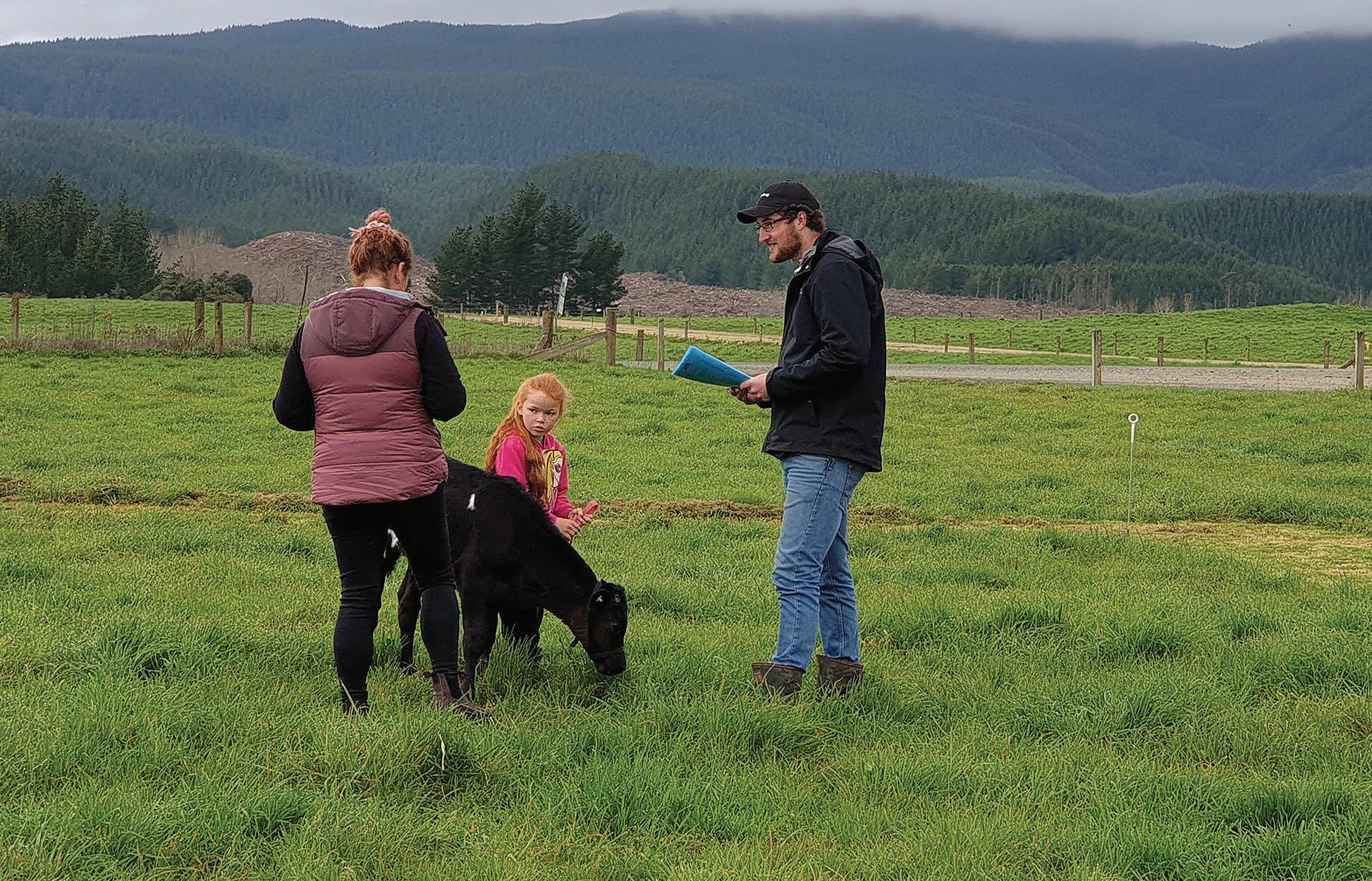
Giving back to Calf Club
By Anne Boswell
Braydon Schroder has achieved a lot in his 23 years, and now he’s helping Kiwi kids follow in his footsteps and develop a passion for the dairy industry at a young age.
The Bay of Plenty farm consultant is an integral part of the Calf Club NZ judging team, bringing almost 20 years of calf club, judging and cattle fitting experience to the table.
“As a child, I loved calf club and if I can share just a few tips, tricks or techniques with the kids then that’s great,” Braydon says.
Calf Club NZ judging took place over the October school holidays, with judges visiting kids on-farm to assess them and their calves in rearing, leading and type categories.
Braydon judged not one, but two regions – East Waikato and South
Waikato – giving him the opportunity to assess 30 calves and their handlers.
He says the kids that entered the competition and registered an animal really went the extra mile to build a close relationship with their calves.
“They have put a lot of time and effort into the care and attention of their calves, as well as leading,” he says.
Braydon Schroder
“It makes judging a lot more interesting and requires more time with each child when the quality of entrants is so high.”
Braydon also took two trainee judges on the road with him, teaching them cattle judging skills along the way.
“Teaching other people to judge has been a big bonus of being involved in Calf Club, and it’d be great to see more judges training others,” he says.
“People are often interested in the ins and outs of judging cattle, but few have the confidence to take it to the next step and actually become a judge.
“The easiest way to learn is to come out with a judge and get that experience first-hand.”
Braydon started competing in school ag days as a primary school student, entering a pet lamb before moving onto calves. By the end of primary school he was rearing two calves each season, and had started competing at regional A&P and national agricultural shows, winning several awards at the New Zealand Dairy Event.
His interest continued to evolve and after overseas opportunities in Australia and Canada as a cattle fitter (prepping stock for the show ring) and handler for a number of breeders, he now prepares
and shows his own cattle, and others’, when time allows.
Braydon has also competed in judging competitions overseas, as well as having judged over 10 school-based agricultural group days at home.
“It’s hard to balance competing/ showing with a busy full-time job, so judging Calf Club has given me the opportunity to see more calves, hone my skills and build my confidence,” he says.
Braydon says the main reason he started judging Calf Club was to give back to the event that has given him so much enjoyment.
“I’ve picked up so many little tips and tricks along the way, I thought it would be great to pass these on to kids, which the Calf Club NZ format allows to happen,” he says.
“To be able to see such a minute amount of detail, like what brushes the kids are using or where on-farm they are leading their calves … you can’t go past that level of attention.
“Hopefully I can encourage kids to move through the competitive levels at an earlier age, which is a good experience for them.
“If they take only one or two pieces of advice away from what I’ve told them, then that’s awesome.”
Braydon says there are also learning opportunities for adults who become Calf Club judges.
“There are practical skills you learn that you can apply to your own farm business, such as cattle breeding and selecting genetics ensuring animals last longer in your herd,” he says.
“Or you may simply want to become involved if you have fond memories of competing in calf club yourself, or if your child is involved.”
Braydon says there are endless benefits for children to participate in Calf Club NZ.
“There is so much learning potential for them; 10 times more than they would get from a school ag day,” he says.
“They are exposed to a wider competition, they get longer with the judge to learn tips and tricks, and they are able to be part of a competition that really tests their ability.
Braydon Schroder is also helping to train new judges for Calf Club. Braydon shares some tips with Sabian Abrams, 5, during judging.
“And if they have a slight passion for the dairy industry, it might encourage them to take that passion further.”
Braydon says he believes Calf Club hasn’t reached its full potential yet due to certain regions yet to be engaged. Advertising through primary schools and secondary schools will hopefully aid in its growth.
“Having experienced and passionate people running Calf Club is an integral part of its future, and I think those currently on board are fulfilling that responsibility,” he says. n
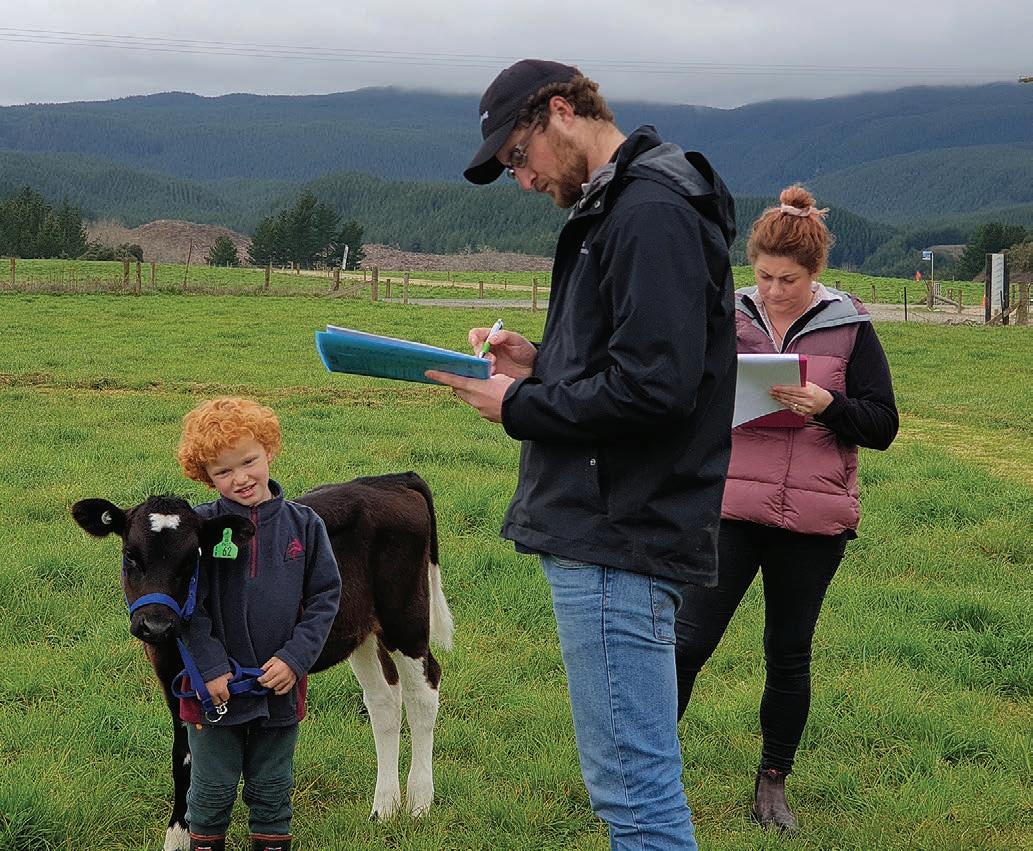
Committed to making safer and healthier farms
No job to big for The Hoofman Hooftrimming made easy by the experts

Lame cows and bulls Preventative trimming Heifer teatsealing Bulls – preventative blocking Hoof knife sharpening
Available North Island wide
Johan Buys – 021 466 367
